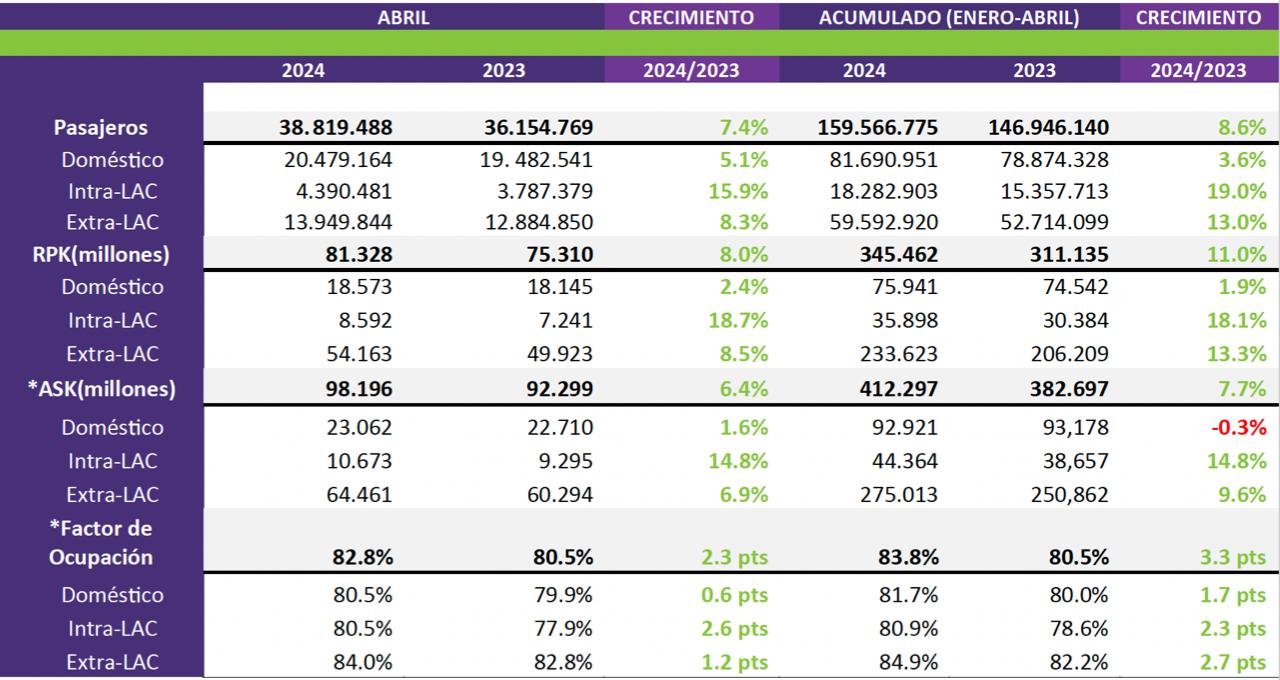Source: ALTA
Air passenger traffic in Latin America and the Caribbean grew by 7.4% in April 2024, totaling 38.8 million travelers, an increase of 2.7 million compared to April 2023. Notably, the international market saw a 10% growth, with 18.3 million passengers total. Mexico, Brazil, Colombia, the Dominican Republic, and Panama were the five busiest countries by international passenger numbers.
The extra-regional international segment grew by 8.3%, reaching almost 14 million passengers, 1.06 million more than in April 2023. The most significant extra-regional international market by passenger numbers was Mexico-USA, with 3.3 million passengers in April.
The intra-regional category had the highest percentage increase, with a 16% rise, adding 603,000 passengers in April. The most considerable increases were seen on routes between Brazil and Chile (+56%) and Argentina and Brazil (+23%).
Traffic to Europe increased by 7%, particularly on the Lima-Madrid route, which increased its frequencies by 30%. Traffic to and from Africa also grew remarkably by 80% during the month.
“April was a positive month for air traffic in Latin America and the Caribbean, consolidating the growth trends seen in recent months. So far this year, we have recorded a significant increase of 9%, with 159.6 million passengers traveling by air. These figures reflect the essential role of air transport in the region, despite the challenges faced by the sector,” said José Ricardo Botelho, ALTA’s Executive Director and CEO.
Colombia Leads the Domestic Market
Colombia recorded a 12.6% growth in domestic passenger traffic in April, reaching a total of 2.4 million passengers. This accounted for 61% of the region’s total domestic traffic growth, which increased by 5.1%, totaling 20.5 million passengers. Colombia also saw the largest absolute increase in the domestic market, with 271,000 additional passengers. The Bogotá-Medellín route was the second busiest regional domestic route in April, with 443,268 passengers.
The São Paulo (CGH) – Rio de Janeiro (SDU) route was the main domestic route in Latin America and the Caribbean, with 556,952 passengers and a 5% increase in April.
Mexico and Argentina: The Lowest Results
In Mexico, domestic traffic continued to fall below 2023 levels, with a 7% drop, reaching almost 5 million passengers, which is 360,000 fewer travelers than in 2023. The most significant decline was seen on the Cancun (CUN) to Monterrey (MTY) route, with a 26% reduction in the number of flights. Despite the challenges in the Mexican domestic market, the route between Saint Lucia (NLU) and Cancun increased by 86%.
In Argentina, there was a 10.3% reduction, equivalent to 133,000 fewer passengers than in April 2023, with 1.2 million people traveling. This decline is partly due to the decrease of 48,200 passengers caused by the cancellation of 378 flights in April.
ALTA’s CEO emphasized that the region needs to continue strengthening its infrastructure, regulations, and capabilities to sustain the growth in demand for air travel in Latin America. “We look to the future with confidence and determination, committed to continuing to drive development and access to the safest and most efficient means of transportation in the region,” said.

